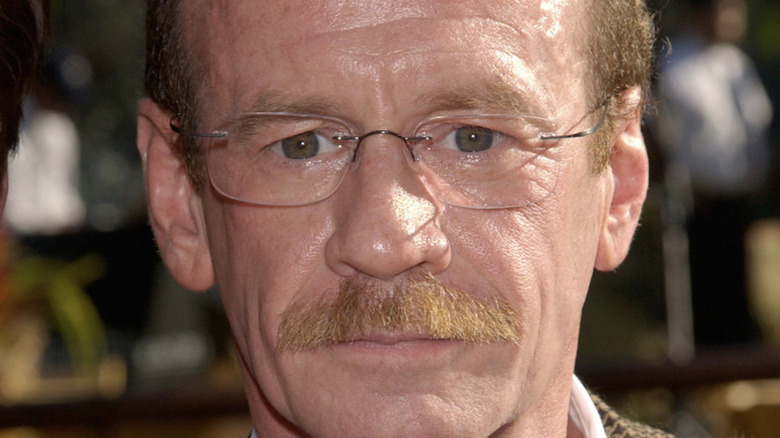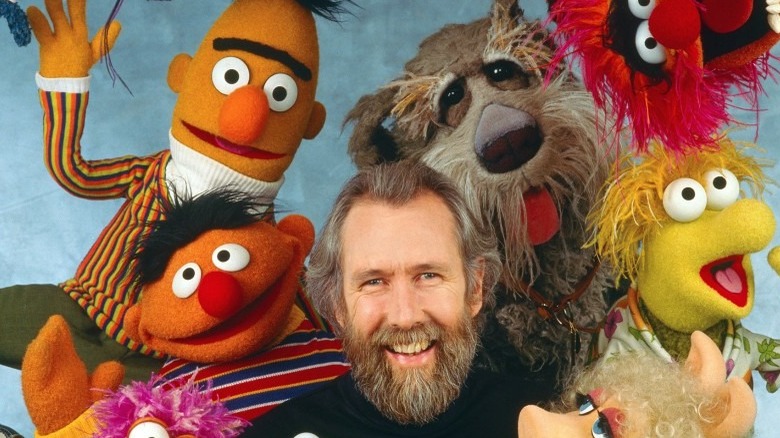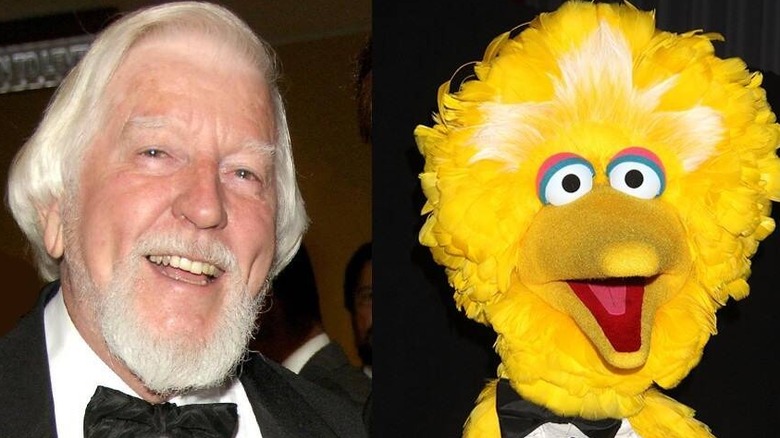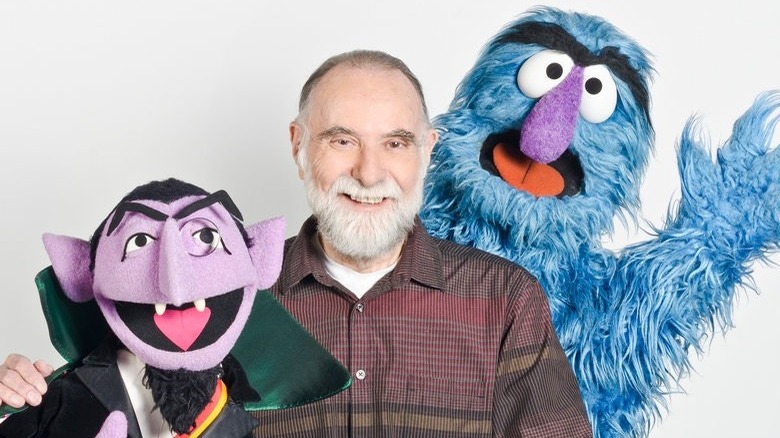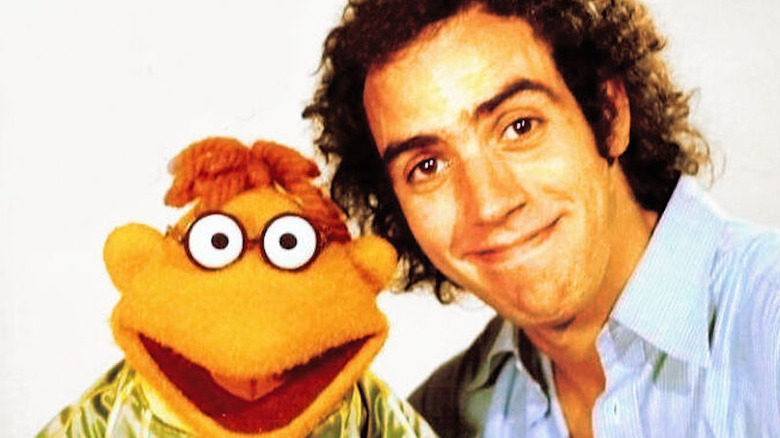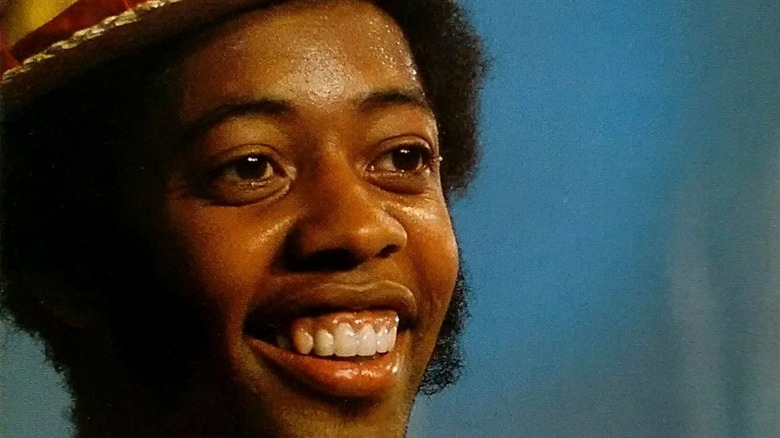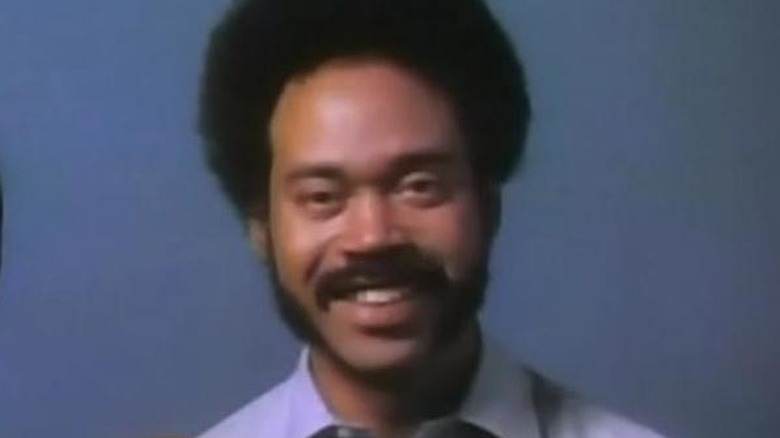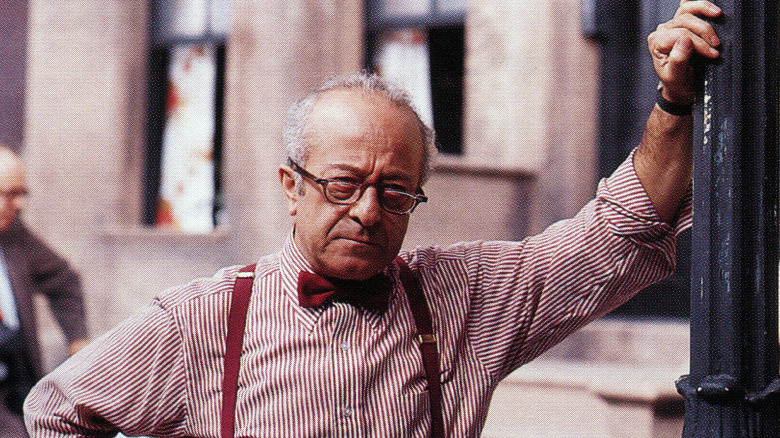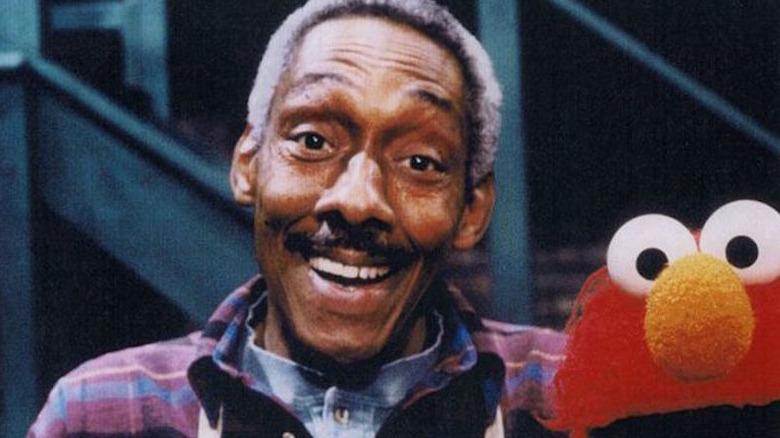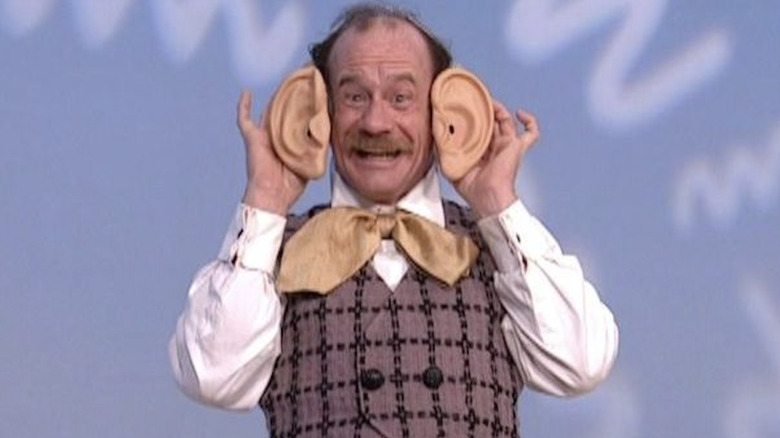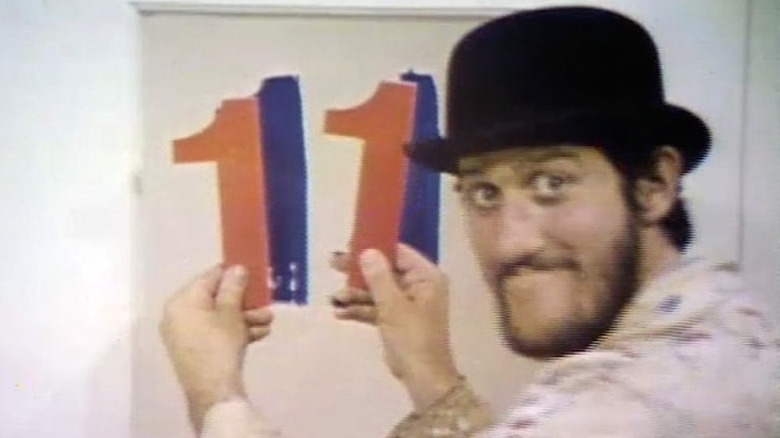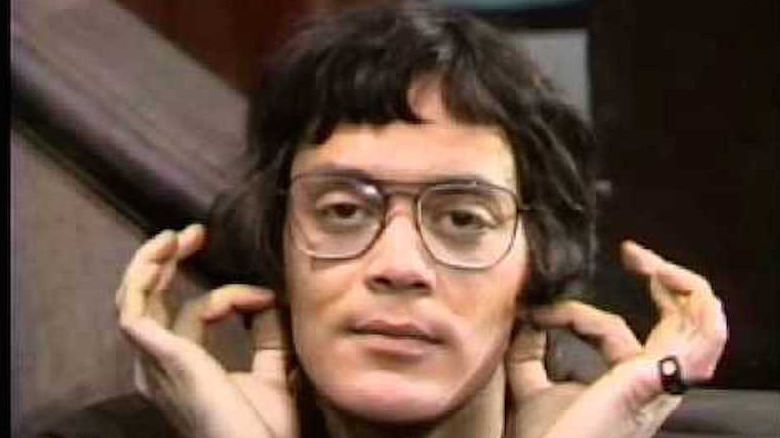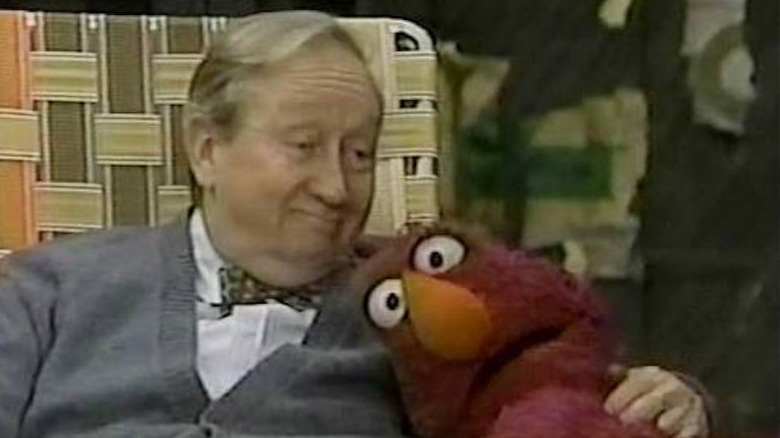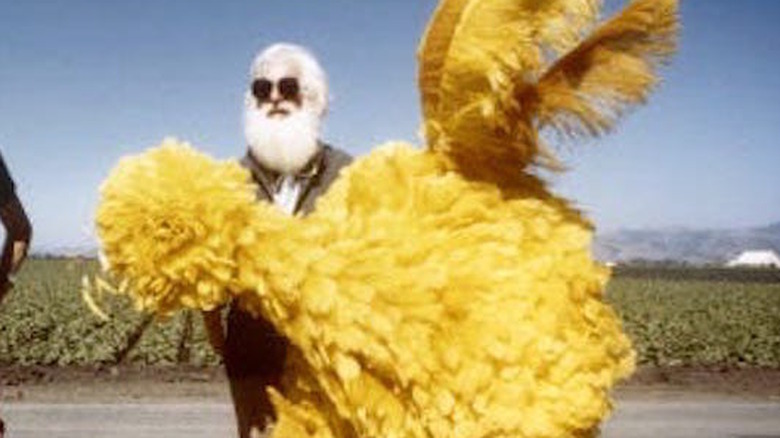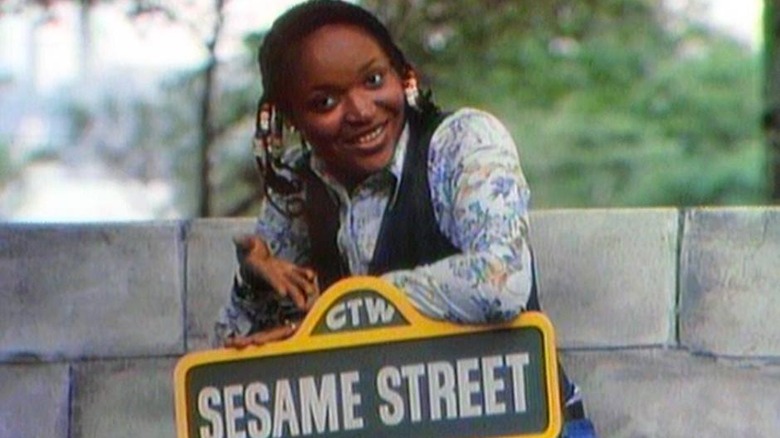Sesame Street Actors You May Not Know Passed Away
Since 1969, the series "Sesame Street" has offered young viewers a friendly, imaginative place where important lessons – both educational and social – are addressed through a diverse cast of humans and puppets using irreverent humor and relatable situations to impart their message. The series, produced by Sesame Workshop (formerly known as the Children's Television Workshop), has created some of the most beloved figures in children's programming, including Big Bird, Elmo, Oscar the Grouch, and Grover – all Muppet creations of puppeteer Jim Henson and operated originally by him and future "Muppet Show" vets Frank Oz and Jerry Nelson. The show also brought us the magic of Caroll Spinney, who operated both Big Bird and Oscar for nearly 50 years.
"Sesame Street" has also featured a host of actors who have gone on to become well-loved figures for young viewers, many of whom, like Bob McGrath (who played the kindly Bob) and Roscoe Orman (the fatherly Gordon), remained with the series for decades. Like many long-running shows, "Sesame Street" has undergone numerous cast and creative personnel changes over the years.
Below is a list of some beloved "Sesame Street" actors who may have helped shape your childhood — and who you might not realize have since passed away.
Jim Henson - master of muppets
Though "Sesame Street" has always featured vibrant and multitalented human performers, award-winning writing and memorable animation and live-action segments, its most enduring element is inarguably its cast of Muppets. Big Bird, Elmo, Cookie Monster, and other such creations have transcended the simple, one-dimensional puppets that populated children's programming before the show came on — sorry Howdy Doody, you just can't hold a candle to Cookie Monster. The engine that fueled the Muppets from day one — and in the case of Kermit the Frog, Ernie, and others, actually operated them — was legendary puppeteer, writer, and director Jim Henson.
Henson would parlay the success of the Muppets on "Sesame Street" and their own syndicated series "The Muppet Show" into numerous feature film ("Labyrinth" and "Dark Crystal," among them) and television projects (like "Fraggle Rock" and "Emmet Otter's Jug-Band Christmas"). But his energy and creativity, which at times seemed boundless (and earned Henson multiple Emmys, Grammys, and other awards) was cut short on May 15, 1990, when Henson was hospitalized with breathing difficulties in New York City. The cause of the sudden illness — a bacterial infection that spread to his internal organs — resulted in Henson's death at the age of 53 the following day.
Henson is still considered one of the true geniuses of our time, as exemplified in a classic Apple ad. Disney and the Jim Henson Company are currently developing a film about Henson's life.
Caroll Spinney: He was Big Bird (and Oscar)
For nearly a half-century, whole-body puppeteer Caroll Spinney played Big Bird, the eternally six-year-old and perpetually curious heart and soul of "Sesame Street," as well as the embodiment of the show's mission to connect children with education through entertaining stories and characters. Playing the eight-foot-two-inch bird was a challenge – Spinney operated Big Bird's head with one upraised hand and one wing with the opposite arm while also watching the scene (and reading his lines) from a monitor and script, respectively, inside the costume.
When not operating Big Bird, Spinney also voiced and operated another iconic character, Oscar the Grouch. The character's prickly attitude — a counterpoint to the "sunny days" perspective of the rest of the cast — made him an immediate pop culture icon for dyspeptic types, and led to appearances outside the "Sesame Street" universe, including "Portlandia," "Scrubs," and "Night at the Museum."
Spinney operated both Big Bird and Oscar until 2015, when the physical demands of both characters forced him to step down as puppeteer. He continued to record the voices for his beloved roles until retiring from the series in 2018. Spinney, who won four Daytime Emmys and a Lifetime Achievement Award from the National Academy of Television Arts and Science (and was the subject of a 2015 documentary, "I am Big Bird") died at his home in Woodstock, Connecticut on December 8, 2019, at the age of 85.
Jerry Nelson helped you count as the Count
A lead puppeteer on "Sesame Street," "The Muppet Show," "Fraggle Rock" and many other Muppet-related projects, Jerry Nelson performed as some of the best-loved supporting players on the "Street," including the Count von Count, Herry Monster, and Sherlock Hemlock. Many of Nelson's recurring characters were staples of the show's early seasons, like the Amazing Mumford, lecturer Herbert Birdsfoot, the aggrieved Mr. Johnson/Fat Blue, and adolescent Little Jerry.
He also teamed with Richard Hunt for two characters: the Two-Headed Monster (for which he teamed, after Hunt's death, with David Rudman) was a character created especially for them, and they also operated Mr. Snuffleupagus. Though as Nelson noted in a 2009 interview, his duties on the "Muppet Show," which included Floyd Pepper, Lew Zealand, and Dr. Julius Strangepork, required him to vacate the oft-unseen Muppet.
Nelson handled the majority of his Muppet characters from the 1970s to the 2000s, when health issues required him to step down from his puppeteering duties. His final Muppet performance came, albeit without a credit, as the telethon announcer in 2011's "The Muppets." Nelson, who suffered from emphysema, died from complications of that illness at the age of 78 on August 23, 2012.
Richard Hunt was a Muppet all-star
Puppeteer Richard Hunt had been a fan of Jim Henson's Muppets prior to joining their ranks in 1970. "I'd drop anything to watch them," he said.
He moved quickly up the ranks from background player to one of the primary performers on "Sesame Street," "The Muppet Show" and "Fraggle Rock," among many other Muppet projects. His "Sesame Street" characters — the silent construction worker Sully, crooning bovine Gladys the Cow, and the perpetually frustrated songwriter Don Music — were less well known than his "Muppet Show" roles (Scooter, Janice, Beaker, and Sweetums, among others), but fans and collaborators alike appreciated the enthusiasm he brought to each character.
Hunt, who also appeared in live-action roles in Muppet projects ("The Great Muppet Caper") and unrelated films and television (he played Wilson, the trader who got overrun in the finale of "Trading Places"), died from HIV complications in Manhattan, New York on January 2, 1992. He was 40 years old.
The sad story of Northern Calloway, Sesame Street's David
The rise and fall of actor Northern Calloway, who played David on "Sesame Street" from Seasons 2 through 20, is one of the saddest behind-the-scenes stories in the show's long history. A veteran of the New York stage, Calloway brought Broadway vitality to David, a young law student who worked part-time at Hooper's store; David's romance with Sonia Manzano's Maria also made him half of a popular and positive interracial couple — a true rarity on television in the 1970s.
In addition to playing David, Calloway also voiced two Muppet characters — Baby Breeze and Same Sound Brown — wrote and recorded songs for several "Sesame Street" recordings, and was featured in a number of related books. But Calloway's tenure on "Sesame Street" began to unravel in 1980, when he was arrested in Nashville, Tennessee after a violent and erratic spree that included property damage and assault.
After hospitalization and treatment, Calloway returned to "Sesame Street," but continued erratic behavior led to his dismissal in 1989. Soon after, he was placed in a psychiatric facility, dying after reportedly suffering a seizure January 9, 1990.
If you or someone you know is struggling with mental health, please contact the Crisis Text Line by texting HOME to 741741, call the National Alliance on Mental Illness helpline at 1-800-950-NAMI (6264), or visit the National Institute of Mental Health website.
Matt Robinson was the original Gordon
Though Roscoe Orman is best known for playing Gordon on "Sesame Street," he wasn't the first actor in the role. There were, in fact, two actors who preceded him: Hal Miller played him from 1972 to 1974, while Matt Robinson originated the role and played Gordon from the show's first episode in 1969 until 1972.
Robinson, a playwright and television writer/producer, joined "Sesame Street" as a producer, but stepped into the role of Gordon when initial casting decisions failed to pan out. Robinson saw the series as an opportunity to present positive Black images on television through his turn as Gordon and his Muppet creation, a boy named Roosevelt Franklin.
Roosevelt gave Robinson and "Sesame Street" the chance to introduce young viewers to Black cultural history through a series of schoolroom skits; though a popular character, Roosevelt was seen by some producers and critics as a negative stereotype because of his occasionally unruly behavior. Robinson, who left "Sesame Street" in 1972, continued to write and perform as Roosevelt until 1975.
After "Sesame Street," Robinson wrote numerous network TV episodes and features, earned a Daytime Emmy for his writing on "Captain Kangaroo," and served as producer and story editor for "The Cosby Show." Diagnosed with Parkinson's disease in 1982, Robinson died from it at the age of 65 on August 5, 2002. His daughter, actress Holly Robinson Peete, and her husband, NFL quarterback Rodney Peete, established The HollyRod Foundation, which supports individuals with Parkinson's and autism, in 1997.
Will Lee's Mr. Hooper was the focus of a groundbreaking episode
Though Will Lee's acting career began in the 1930s, he would not receive widespread recognition until 1969, when he was cast as Mr. Hooper — the owner and proprietor of Hooper's Store — on "Sesame Street." A curmudgeon with a soft heart, Hooper was best showcased in sequences with Caroll Spinney's Big Bird, to whom he showed a fatherly affection and patience, no matter how many times the eight-foot avian mispronounced his name ("Cooper," "Looper," etc.).
Lee taped his final appearances on "Sesame Street" in November of 1982, two weeks before his death from a heart attack at age 74 on December 7, 1982. Unsure of how to acknowledge his passing to the show's audience, producers at the Children's Television Workshop created an episode that would not only pay tribute to Lee, but also help young viewers to understand and process the difficult emotions that arise after the death of a person close to them.
The episode, "Farewell Mr. Hooper," which aired on Thanksgiving Day in Season 15, devoted its final segment to Big Bird inquiring after Mr. Hooper, only to be reminded by the human cast members that Hooper had passed away. Big Bird experienced a rush of emotions — fear, grief, anger — before ultimately finding a way to grieve and pay homage to his friend. The episode, quite possibly the most famous "Sesame Street" ever produced, has been cited numerous times as an outstanding achievement in children's programming, and helped earn the series a Daytime Emmy in 1983.
Two Mr. Handfords took over Hooper's Store
Northern Calloway's David eventually took over Hooper's Store, but following his departure from the series, it was owned and operated by David Handford, known to Muppets and humans alike as retired firefighter Mr. Handford. Initially played as something of a Hooper-esque curmudgeon by Leonard Jackson, a character actor whose credits included "Car Wash" and "The Color Purple" (as well as a long stint on "Shining Time Station" as engineer/mechanic Harry Cupper), Mr. Handford was transformed into a kinder, gentler shopkeeper by actor/writer David L. Smyrl, who played the role from Season 22 in 1990 to Season 29 in 1998, and netted eight Daytime Emmy Awards for his performance.
Smryl, who began his career as a Broadway actor before segueing into writing for "Benson" and "The Cosby Show," also lent his voice to numerous television commercials. After leaving "Sesame Street," he appeared sporadically on television until 2006; a decade later, Smyrl died from lung cancer at the age of 80 on March 22, 2016. Leonard Jackson preceded him in death three years prior, dying at the age of 85 from undisclosed causes on December 22, 2013.
Michael Jeter donned the baggy pants as Mr. Noodle
An award-winning actor on stage and television as well as numerous films, Michael Jeter's talent for physical comedy was given a terrific showcase when he stepped into the role of Mr. Noodle's brother — also named Mr. Noodle — in the "Elmo's World" segments. The talented actor/clown Bill Irwin originated the role of the silent, bumbling-but-determined Mr. Noodle in Season 30, but became unavailable for segments the following season. Enter Jeter who, as Mr. Noodle's brother, Mr. Noodle, dutifully attempted to carry out Elmo's requests to demonstrate simple ideas or actions in perfect pantomime.
Jeter, whose busy film and television career also included an Emmy-winning stint on "Evening Shade" and character turns in "Jurassic Park III," Terry Gilliam's "The Fisher King," and "The Green Mile," remained as Mr. Noodle for the next three seasons, occasionally being joined by Irwin for select segments.
After completing voice and motion capture acting for "Open Season" and "The Polar Express," Jeter was found dead in his Hollywood home at the age of 60 on March 23, 2003. Irwin has since carried on as Mr. Noodle on "Elmo's World," and has been joined by new brothers and sisters, including Kristin Chenoweth and Daveed Diggs.
You may have learned numbers from Paul Benedict's Mad Painter
One of the best examples of the offbeat humor that fueled the educational lessons on the early days of "Sesame Street" was a character known alternately as the Mad Painter or Number Painter, who was used to demonstrate number recognition. A bearded beatnik-type with a bowler hat and striped shirt, the painter — played by actor Paul Benedict of "The Jeffersons" fame — was compelled in ten short skits (each silent and running for no more than 90 seconds) to paint a number on the first available surface he could find.
Said surfaces included a boat sail, a large cake, a bar stool, and the ball in a gorilla's cage. The Painter's zeal invariably drew the ire of two recurring guest stars — The Lady (played by Stockard Channing), and the easily aggravated Mac (Jerome Raphael), whose bald head was used as the canvas for the number 8.
Benedict, an acclaimed stage actor who shared the stage Robert De Niro and Al Pacino, was frequently cast in comic roles in features, most notably in Christopher Guest's mockumentaries "This is Spinal Tap," and "Waiting for Guffman," in which he's mistaken for the titular critic. The 70-year-old Benedict died from apparent natural causes at his home on Martha's Vineyard, Massachusetts, on October 1, 2008.
Raul Julia briefly shared the Fix-It Shop with Luis
Though Emilio Delgado's Luis and Sonia Manzano's Maria were the best-known and longest-running owners of the Fix-It Shop on "Sesame Street," another Latino character also oversaw the store's endless stream of broken toasters in Season 3. Rafael was the co-owner of the Fix-It Shop, which was initially known as the L&R Fix-It Shop. Playing Rafael in a handful of episodes was the Tony Award-nominated and Emmy- and Golden Globe-winning actor Raul Julia, best known for many Broadway roles and features like the '90s "Addams Family" films.
Though his run on the series was short-lived — Julia departed the series before Season 4 — Rafael was yet another "Sesame Street" attempt to put forward positive minority characters in a multi-ethnic, multi-cultural universe that reflected the real world for many of its viewers. Diagnosed with cancer in 1991, Julia died from complications of a stroke at the age of 54 in Manhasset, New York on October 24, 1994.
Bob's lovable Uncle Wally was played by Bill McCutcheon
A traveling salesman whose suitcase seemed to contain any item, regardless of its size, Bob's Uncle Wally proved that gentleness and charm was a family trait. As played by Bill McCutcheon — a Broadway veteran who won Tony and Obie Awards during his long stage career — Uncle Wally was a lovable, grandfatherly figure with a wealth of stories from life on the road, and a host of unique friends, including a trained seal named Wolfgang.
His most valuable contribution to the program was Uncle Wally's willingness to listen and engage with the children and Muppet characters, offering unwavering faith and interest in their thoughts. For his work on the series from Seasons 15 to 23, McCutcheon won three Daytime Emmy Awards
In addition to his stage work, McCutcheon appeared on numerous television series, including other children's programming like "Captain Kangaroo," and several features, ranging from "Santa Claus Conquers the Martians" to "Steel Magnolias." He died from natural causes at the age of 77 at his home in Mahwah, New Jersey, on January 9, 2002.
Kermit Love, Muppet maker extraordinaire
Chances are you might have glimpsed Kermit Love as Willy, the hot dog vendor he played on episodes of "Sesame Street," as early as 1970. His bushy white beard and straw hat — always sporting a yellow feather — made him immediately identifiable, but that feather was also a reminder of his most important contributions to "Sesame Street" history: Love co-created the costume for Big Bird, co-designed Mr. Snuffleupagus, and helped build both Oscar the Grouch and Cookie Monster. Though he had worked with Jim Henson from the early 1960s through the 1980s, Love insisted that he was not the namesake for Kermit the Frog.
Love also designed puppets for "The Muppet Show" and international versions of "Sesame Street" — most notably for Germany's "Sesamstrasse," for which he created the character of Samson the bear. He had a long career prior to "Sesame Street" as a costume designer and creator for Broadway shows and American ballet, dating back to the 1930s. Love died from congestive heart failure at the age of 91 on June 21, 2008.
Alaina Reed-Amini joined the Street as Gordon's sister, Olivia
Actress and singer Alaina Reed-Amini (who was also billed as Alaina Reed and Alaina Reed-Hall) helped many "Sesame Street" viewers understand the complicated nature of sibling relationships playing Gordon's younger sister, Olivia. Introduced in Season 8, Olivia was a photographer who returned to Sesame Street after working in Detroit; her relationship with Gordon became a vehicle for young audiences to see that siblings could disagree on matters and still love and respect each other.
Reed-Amini, who began her career in stage and nightclub productions, was frequently showcased in musical numbers on "Sesame Street," proving adept at everything from jazz and soul to opera and lullabies. In the final years of her "Sesame" stint, Reed-Amini split her screen duties between the children's program and the popular NBC sitcom "227," for which she played Marla Gibbs' friend and landlady, Rose.
The two jobs required her to travel between Los Angeles for "227" and New York for "Sesame Street," and she eventually departed the latter for fulltime work in 1988. Following the cancellation of "227" in 1990, Reed-Amini worked steadily as a guest performer on numerous television series, including "Friends" and "ER."
Reed's diagnosis of breast cancer in 2007 led to her inclusion in a 2009 documentary "Breast Cancer Examined: An African-American Perspective." She died from the disease on December 17 of that same year at the age of 63.
